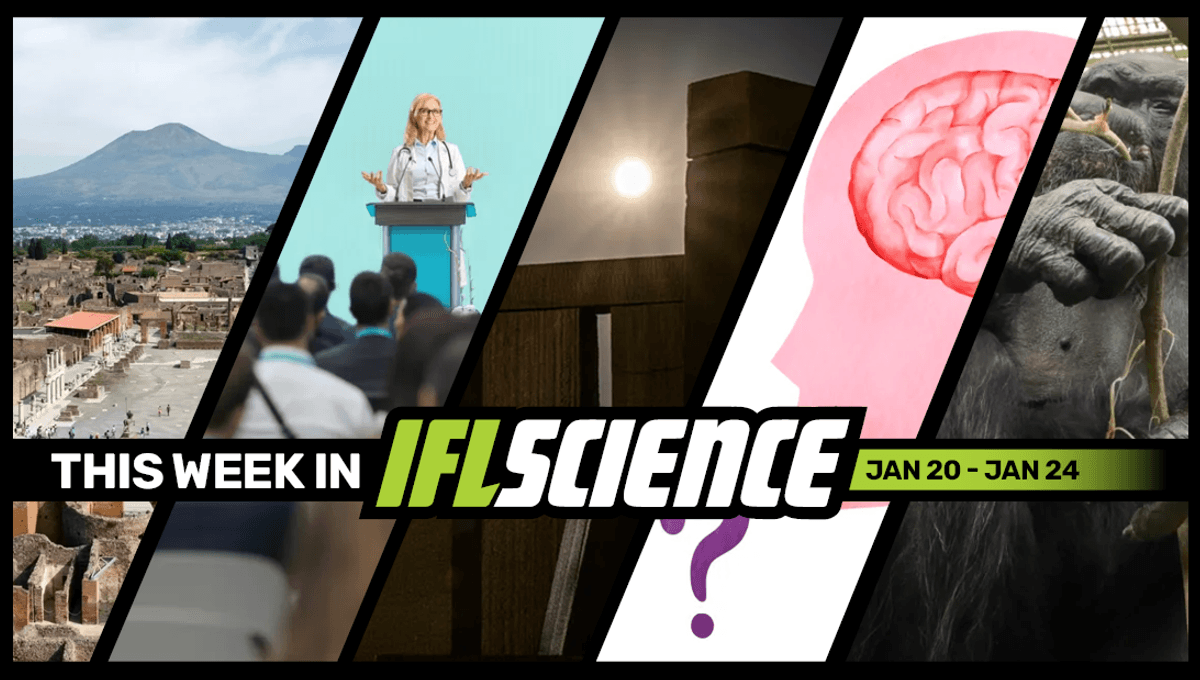
This week, a new analysis puts into question if the COVID-19 lockdowns really did affect the temperature of the Moon, the largest study of its kind suggests that sex differences may be present in the human brain from birth, and scientists were surprised to see chimps exhibiting signs of contagious urination. Finally, we asked palaeontologists what the best dinosaur movie is in their opinion.
Create an IFLScience account to get all the biggest science news delivered straight to your inbox every Wednesday and Saturday.
The Volcanic Eruption That Annihilated Pompeii Was 32 Hours Of Pure Hell
ADVERTISEMENT GO AD FREE
When Mount Vesuvius erupted in 79 CE, the scolding lava, ash, and gas that poured from its entrails converted the Roman city of Pompeii into a terrifying snapshot of death and destruction. Two millennia on, researchers have finally recreated a blow-by-blow account of the disaster, revealing exactly how the eruption progressed and dragged the city’s residents into the afterlife over the course of a day and a half. Read the full story here
Trust In Science Remains High Across The World
Since the COVID-19 pandemic, there have been wide-scale concerns that science is experiencing a public trust crisis. The rise of misinformation and conspiracy theories, as well as criticisms from high-profile individuals, has led to the idea that science and scientists have lost the confidence of large numbers of people. However, recent research has demonstrated that this may not be the case; the narrative of a crisis in public trust is not supported by the evidence, the authors of a new study say. Read the full story here
Did COVID-19 Lockdowns Really Affect The Temperature Of The Moon?
Scientists have re-examined the claim that the COVID-19 lockdown affected temperatures on the Moon, finding that they may have dropped a little at the Moon’s surface prior to the pandemic. COVID-19 wrought – and continues to wreak – havoc on Earth. According to a study in 2024, its effects were not limited to our planet; the surface of the Moon may have been indirectly affected by the resulting lockdown. However, a new analysis has challenged this conclusion. Read the full story here
Sex Differences In The Human Brain Observed From Birth In Largest Study Of Its Kind
Structural differences between male and female brains are apparent from the very earliest days of life, according to a new study. The researchers found that even in young babies, female brains have more gray matter and male brains have more white matter, as well as an overall larger volume. But what do these findings actually mean? Read the full story here
Contagious Urination Confirmed In Chimps For The First Time, Surprising Scientists
In chimpanzees, peeing is contagious. That’s the surprising conclusion reached by scientists at Kyoto University who described it as “an unexpected and fascinating result”. They conducted observational studies of chimpanzees at a sanctuary and saw that not only did they exhibit contagious urination, but that it was also more likely among individuals with lower dominance and those physically closest to the instigating urinator. Read the full story here
TWIS is published weekly on our Linkedin page, join us there for even more content.
Feature of the week:
What’s The Best Dinosaur Movie According To Palaeontologists? We Asked Some To Find Out
At IFLScience, we love a dinosaur movie. If anything, too much (rumor has it Managing Editor Katy Evans even got excited about The VelociPastor). Safe to say, our opinion on the best dino flick can’t be trusted – which is precisely why we decided to scroll our scientist contact list to find out what the best dinosaur movie is according to actual palaeontologists. It turned out to be an intriguing passion project and one that yielded some answers we really weren’t expecting. Read the full story here
More content:
Have you seen our e-magazine, CURIOUS? Issue 30 January 2025 is available now. This month we asked, “Why Do Humans Love Watching Fire?” – check it out for exclusive interviews, book excerpts, long reads, and more.
PLUS, the We Have Questions podcast – an audio version of our coveted CURIOUS e-magazine column – continues. In episode 5, we ask “How Do You Begin Searching For Alien Life?”
Season 4 of IFLScience’s The Big Questions podcast has concluded. To revisit all of season four’s episodes, click here.
Source Link: Pompeii’s Eruption Was 32 Hours Of Pure Hell, Trust In Science Remains High Across The World, And Much More This Week